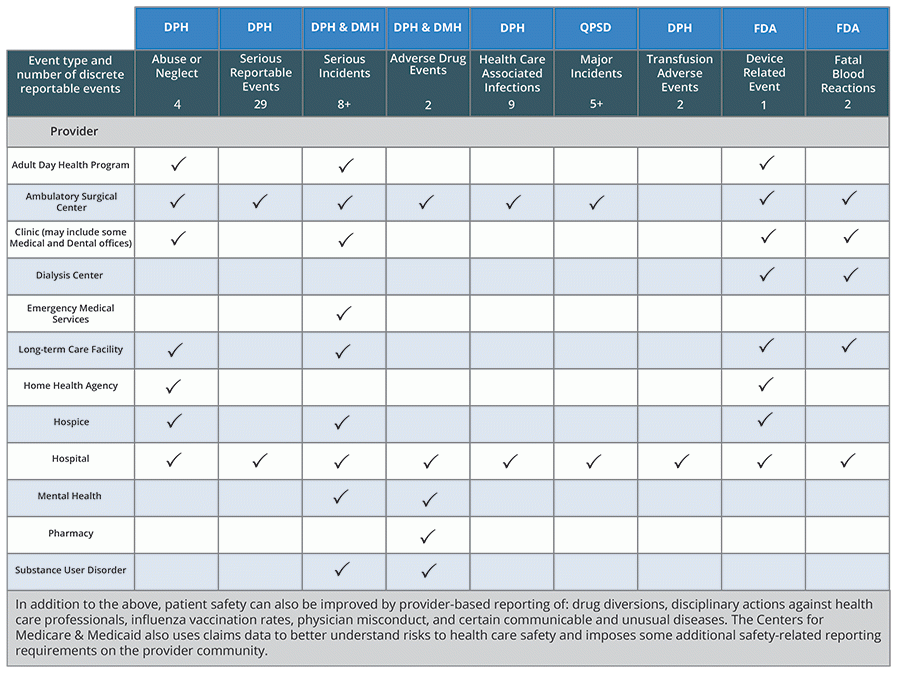

There are four interrelated modules that may be accessed in any order and provide the following information:
Plan
This module helps providers and managers focus efforts on preventing patient harm events from happening in the first place. The module can be used to bolster or build a patient safety plan at provider organizations and practices, especially smaller ones that are new to patient safety planning. It is divided into specific components, such as coordination, objectives, and communication, each of which provides concrete tips and tools. This module contains information adapted from extensive work done by the Massachusetts Health Care Quality and Cost Council.
Report
This module helps Massachusetts health care providers determine what, how, and when key patient safety events should be reported to state and federal agencies, based on the type of provider and the nature of the events. A short set of prompts leads you to the applicable reporting obligations followed by customized instructions on how to report the event to each relevant agency.
Please note that the Report module may not cover all reporting obligations that you may face. See the statement of scope for more information.
Communicate
This module offers resources on effective communication with both affected patients and staff following an adverse clinical event. Here you will find strategies to develop an effective communication approach; resources to provide relevant information about the event to patients; communication, assessment and resolution models developed by local and national organizations; referral information on educational and peer-to-peer support groups for patients and family members, and more.
Analyze
This module helps care teams gain a clear understanding about what went wrong in the aftermath of an adverse clinical event or “near miss” with the goal of preventing it from occurring again. It provides a step-by-step guide to conducting a robust root cause analysis using content and tools adapted from extensive work on the topic by the National Patient Safety Foundation.
No, the Patient Safety Navigator is not a reporting mechanism. Information on the site is only intended to help guide users on what and how to report to relevant agencies following an adverse event. Similarly, we are not a regulatory agency and do not serve as an intermediary between reporters and regulators. Instead, providers should report events directly to an agency using its specified system and process.
No, we developed the Navigator with the purpose of providing information, not collecting it. Like most websites, we are interested in aggregated data to improve user experience. See our Privacy Statement for more information.
The module is primarily for health care providers in Massachusetts, particularly facilities and programs licensed by state agencies, such as the Department of Public Health. Limited information is also available for individual providers who would like to learn more about their professional reporting obligations.
At the state level, the facility-specific information is primarily drawn from the patient safety reporting requirements of three licensing agencies: the Department of Public Health; the Board of Registration in Medicine’s Quality and Patient Safety Division; and the Department of Mental Health. At the federal level, the module primarily addresses reporting to the Food and Drug Administration and use of data collection tools such as the Centers for Disease Control and Prevention’s National Healthcare Safety Network. We also offer some high level overviews of other patient safety reporting as described in the chart below.
The module does NOT include reports to accrediting entities such as the Joint Commission, nor reports required by private or public health plans such as Medicare or MassHealth.
Please see our statement on scope for more detail on what information is and is not included in the Report module.

We recognize the importance of keeping the Navigator’s content up-to-date, and will make reasonable efforts to update it as needed. However, incorporating new regulations or guidance takes time, and users should anticipate a reasonable “lag time” before new regulations are reflected on this site. Reporting obligations and systems may also change without our knowledge. The Betsy Lehman Center cannot guarantee that information on this site — including regulations, links, guidance documents, forms, and contact information — are current, and users are solely responsible for determining their reporting obligations. Please see the Terms of Use for full details.
Please let us know! Comments — including corrections to content — may be submitted via the Navigator’s feedback page. Please be as specific as possible in your description.
If you find that the circumstances of your adverse event partially or loosely match an agency’s description of a reportable event, but you are still unsure whether or not you need to report, please contact the relevant agency directly for more guidance.